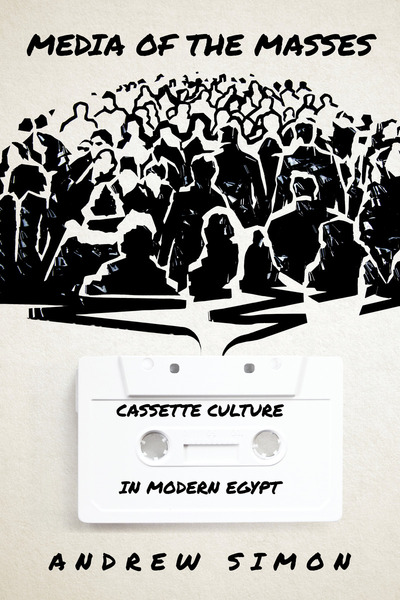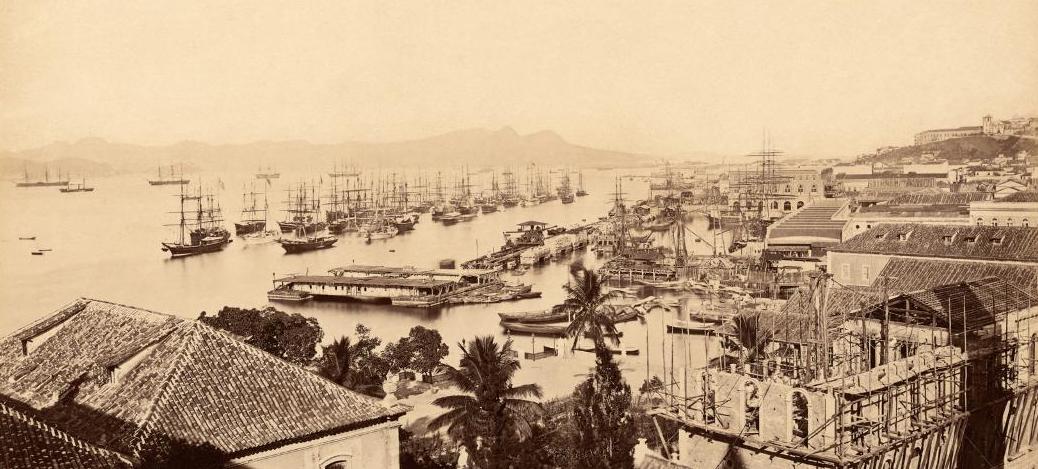Media of the Masses in Modern Egypt
hosted by Chris Gratien
| The Egyptian revolution of 2011 is one of the most spectacular examples of how social media has played a pivotal role in political movements of the 21st century. However, in this final installment of our four-part series on "The Sound of Revolution in Modern Egypt," we argue that the true beginning of Egypt's media revolution arrived with the cassette tape, which for the first time, made it possible for every Egyptian to be a producer rather than a passive consumer of popular culture. As our guest Andrew Simon explains, this veritable "media of the masses" was not only a means of disseminating commercial music. Western pop music and classics of the Nasserist era mingled with new underground music, religious content, home recordings, and personal voice messages on Egyptian cassettes, which circumvented and subverted state censorship. Artists like Sheikh Imam and the poet Ahmed Fouad Negm produced celebrated political satire that defined the sound of the Infitah era, much to the chagrin of state authorities and the commercial recording industry. In 2011, when Egyptians took to the streets to protest the Mubarak regime, Imam's songs along with a century of sound stretching back to the First World War filled Tahrir Square in Cairo, as a new generation produced new sounds of revolution. We conclude our series with reflections from Alia Mossallam and Ziad Fahmy on the sounds of the square in 2011 and what they reveal about change and continuity in Egyptian politics.
 | Click for RSS Feed | 
|

|
The Egyptian revolution of 2011 is one of the most spectacular examples of how social media has played a pivotal role in political movements of the 21st century. However, in this final installment of our four-part series on "The Sound of Revolution in Modern Egypt," we argue that the true beginning of Egypt's media revolution arrived with the cassette tape, which for the first time, made it possible for every Egyptian to be a producer rather than a passive consumer of popular culture. As our guest Andrew Simon explains, this veritable "media of the masses" was not only a means of disseminating commercial music. Western pop music and classics of the Nasserist era mingled with new underground music, religious content, home recordings, and personal voice messages on Egyptian cassettes, which circumvented and subverted state censorship. Artists like Sheikh Imam and the poet Ahmed Fouad Negm produced celebrated political satire that defined the sound of the Infitah era, much to the chagrin of state authorities and the commercial recording industry. In 2011, when Egyptians took to the streets to protest the Mubarak regime, Imam's songs along with a century of sound stretching back to the First World War filled Tahrir Square in Cairo, as a new generation produced new sounds of revolution. We conclude our series with reflections from Alia Mossallam and Ziad Fahmy on the sounds of the square in 2011 and what they reveal about change and continuity in Egyptian politics.
Contributor Bios
 |
Andrew Simon is a historian of media, popular culture, and the Middle East at Dartmouth College. He was a fellow at the Center for Arabic Study Abroad in downtown Cairo during the 2011 Egyptian Revolution and is the modern history book review editor for the International Journal of Middle East Studies. Andrew is the author of Media of the Masses: Cassette Culture in Modern Egypt (Stanford University Press, 2022), which will be made available in Arabic by Dar El Shorouk this upcoming spring (2024). Currently, he is writing a biography of Shaykh Imam, a blind performer and political dissident, and is in the process of making his private collection of cassettes public in a digital archive for anyone to access. |
 |
Alia Mossallam is a cultural historian, educator and writer interested in songs that tell stories and stories that tell of popular struggles behind the better-known events that shape world history. For her PhD she researched a popular history of Nasserist Egypt through the stories and experiences of the popular resistance in Port Said (1956) and Suez (1967-1974) and the construction of the Aswan High Dam through the experiences of its builders and the Nubian communities displaced by it. As a EUME fellow 2017-21 of the Alexander von Humboldt Foundation, she worked on her book on the visual and musical archiving practices of the builders of the Aswan High Dam and the Nubian communities displaced by it. Her new project at EUME (2021-24), “Tracing Emancipation Under Rubbles of War”, retrieves the physical and political journeys of Egyptian and North African workers on the various fronts of World War I through the songs and memoires that recount their struggles. Some of her research-based articles, essays and short-stories can be found in The Journal of Water History, The History Workshop Journal, the LSE Middle East Paper Series, Ma’azif, Bidayat, Mada Masr, Jadaliyya and 60 Pages. An experimentative pedagogue, she founded the site-specific public history project “Ihky ya Tarikh”, as well as having taught at the American University in Cairo, the Freie Universität in Berlin, and continuing to teach at the Cairo Institute for Liberal Arts. |
 |
Ziad Fahmy is a Professor of Modern Middle East History at Cornell University’s department of Near Eastern Studies. Professor Fahmy is the author of Street Sounds: Listening to Everyday Life in Modern Egypt (Stanford University Press, 2020). Street Sounds was a co-winner of the Urban History Association's 2021 Award for Best Book in Non-North American Urban History. He also wrote Ordinary Egyptians: Creating the Modern Nation through Popular Culture (Stanford University Press, 2011), and is currently writing his third book, tentatively titled, Broadcasting Identity: Radio and the Making of Modern Egypt, 1925-1952. |
 |
Chris Gratien is Associate Professor of History at University of Virginia, where he teaches classes on global environmental history and the Middle East. His first book, The Unsettled Plain: An Environmental History of the Late Ottoman Frontier, explores the social and environmental transformation of the Adana region of Southern Turkey during the 19th and 20th century. |
Credits
Episode No. 564
Release Date: 1 April 2024
Sound production by Chris Gratien
Sound Elements: Abbas & Hindia (digitized cassette, courtesy of Andrew Simon); Seyyid Darwish - Salma ya Salama; 18 Days (2011-01-29) at Downtown Cairo (858 archive); Cassette tape sound effects from Pixabay; Hasan al-Asmar - Ana Gay (digitized cassette, courtesy of Andrew Simon); Abdel Halim Hafez - Sourah; Madonna 87 (digitized cassette, courtesy of Andrew Simon); الشيخ كشك و ام كلثوم; Ahmed Adaweya - Haba Fook we Haba Taht; Abbas & Hindia (digitized cassette, courtesy of Andrew Simon); الحمدلله خبطنا; الشيخ امام - همّا مين واحنا مين; Sheikh Imam - Nixon Baba; 18 Days (2011-01-29) at Downtown Cairo (858 archive); Scenes from Tahrir Square: The Revolution Victorious (Aljazeera); Facebook, Twitter Launch Mideast Revolution (CBS); Naima al-Masriya - Ya Aziz Aini; الجدع جدع والجبان جبان ( مع الكلمات) - الشيخ إمام; El Sharq wal Gharb
Release Date: 1 April 2024
Sound production by Chris Gratien
Sound Elements: Abbas & Hindia (digitized cassette, courtesy of Andrew Simon); Seyyid Darwish - Salma ya Salama; 18 Days (2011-01-29) at Downtown Cairo (858 archive); Cassette tape sound effects from Pixabay; Hasan al-Asmar - Ana Gay (digitized cassette, courtesy of Andrew Simon); Abdel Halim Hafez - Sourah; Madonna 87 (digitized cassette, courtesy of Andrew Simon); الشيخ كشك و ام كلثوم; Ahmed Adaweya - Haba Fook we Haba Taht; Abbas & Hindia (digitized cassette, courtesy of Andrew Simon); الحمدلله خبطنا; الشيخ امام - همّا مين واحنا مين; Sheikh Imam - Nixon Baba; 18 Days (2011-01-29) at Downtown Cairo (858 archive); Scenes from Tahrir Square: The Revolution Victorious (Aljazeera); Facebook, Twitter Launch Mideast Revolution (CBS); Naima al-Masriya - Ya Aziz Aini; الجدع جدع والجبان جبان ( مع الكلمات) - الشيخ إمام; El Sharq wal Gharb
Further Listening
 |
Sylvia Alajaji | 461
4/23/20
|
Music and Silence in the Armenian Diaspora |
 |
Alev Kuruoğlu | 116
8/2/13
|
The Kurdish Music Industry: History and Politics |
 |
Peter McMurray | 321
6/27/17
|
The Sounds of Islamic Berlin |
 |
Elizabeth Perego | 279
11/5/16
|
Dark Humor from Algeria's "Dark Decade" |
Images

A collection of cassettes at a Cairo kiosk (2015). Photo by Andrew Simon

Three Egyptians pose with a cassette radio in Iraq in 1975 in a photo posted on Facebook in 2017

Beethoven and Hassan al-Asmar, a popular Egyptian shaʿbi singer, surface on the same tape (2015). Courtesy of Andrew Simon

Shaykh Imam performs at a private gathering, where a cassette radio records the informal concert (1976); source: Sayyid ʿInaba

A cassette recording showcasing Shaykh ʿAntar Saʿid Mussallam (n.d.); Courtesy of Andrew Simon

"Abd al-Halim Hafiz sings al-Sah al-Dah Ambu!!" (1976); source: Ruz al-Yusuf.
Further Reading

Simon, Andrew. 2022. Media of the Masses: Cassette Culture in Modern Egypt. Stanford California: Stanford University Press.
Armbrust, Walter. 1996. Mass Culture and Modernism in Egypt. New York: Cambridge University Press.
Arnold, David. 2013. Everyday Technology: Machines and the Making of India's Modernity. Chicago: University of Chicago Press.
Danielson, Virginia. 1997. The Voice of Egypt: Umm Kulthum, Arabic Song, and Egyptian Society in the Twentieth Century. Chicago: University of Chicago Press.
Drew, Rob. 2024. Unspooled: How the Cassette Made Music Shareable. Durham: Duke University Press.
El Shakry, Omnia. "'History without Documents': The Vexed Archives of Decolonization in the Middle East." The American Historical Review 120, no. 3 (2015): 920-34.
Fahmy, Ziad. "Coming to Our Senses: Historicizing Sound and Noise in the Middle East." History Compass 11, no. 4 (2013): 305-15.
Hammad, Hanan. 2022. Unknown Past: Layla Murad, the Jewish-Muslim Star of Egypt. Stanford California: Stanford University Press.
Hirschkind, Charles. 2006. The Ethical Soundscape: Cassette Sermons and Islamic Counterpublics. New York: Columbia University Press.
Ryzova, Lucie. 2014. The Age of the Efendiyya: Passages to Modernity in National-Colonial Egypt. New York: Oxford University Press.
Simon, Andrew. 2023. "An Ordinary Icon: Cassettes, Counternarratives, and Shaykh Imam," in Social Voices: The Cultural Politics of Singers around the Globe. Chicago: University of Illinois Press.
Weld, Kirsten. 2014. Paper Cadavers: The Archives of Dictatorship in Guatemala. Durham: Duke University Press.











Comments
Post a Comment
Due to an overwhelming amount of spam, we no longer read comments submitted to the blog.